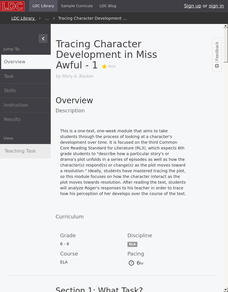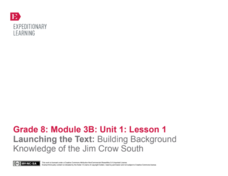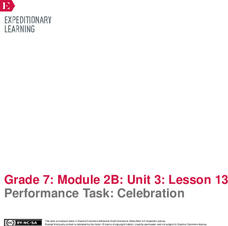Syracuse University
Women's Suffrage Movement
Women gained the right to vote in the twentieth century, but the fight for equality dates back centuries. Using an invitation to an 1874 suffrage convention, eager historians consider the motivations behind supporters of the suffrage...
Literacy Design Collaborative
Text Analysis and Character Revelations: Flowers for Algernon
What does your character reveal about you? Scholars carry out several activities to determine the reveal of character in Flowers for Algernon. Readers answer text dependent questions, complete diary entries, write reflections, and use...
Literacy Design Collaborative
Tracing Character Development in Miss Awful
Scholars take a close look at Roger in Miss Awful. As the plot develops, readers track Roger's perceptions of his substitute teacher. Learners then discuss how Roger's actions toward the substitute changes as the story progresses before...
EngageNY
Grade 11 ELA Module 2: Unit 1, Lesson 13
Some words leave a lasting impact. After reading paragraph 11 of the text "Of Our Spiritual Strivings," scholars closely examine how Du Bois describes the impact prejudice left on the African American community. They discuss the...
EngageNY
Inferring about Character: Close Reading of the Poem “Inside Out” and Introducing QuickWrites
Grab a partner! Scholars partner up to take a second look at the verse novel Inside Out & Back Again. They discuss questions about and connections to the novel and then learn how to complete a Quick Write task properly. To finish,...
Radford University
Quadrilaterals
Connect the quadrilaterals. Working in teams, pupils use a variety of tasks to make connections between special quadrilaterals. With the properties well defined, the groups construct quadrilaterals based on those properties. Learners...
Northeast Georgia Regional Educational Service Agency
The American Revolution
An empowering lesson explores the causes and complaints that led to the American Revolution. Young scholars, starting in fourth grade, complete hands-on activities, role play, and create cartoons to understand the American Revolution and...
National Woman's History Museum
African American Activists
Ida B. Wells, Rosa Parks, and Fannie Lour Hammer are three African American activists who stood up for change. Though living in different time periods, all three women sought justice and equality. Class members examine primary source...
EngageNY
Launching the Text: Building Background Knowledge of the Jim Crow South
Pictures and photographs help build background knowledge about a topic. Scholars participate in a gallery walk to learn more about the Jim Crow era of US history and the desegregation of schools following Brown v. Board of Education....
EngageNY
Understanding Perspective: Japanese Society’s Impact on Japanese Guards (Pages 189-197)
The focus is on written communication as class members respond to questions about the text Unbroken in their Written Conversation note catchers. They trade note catchers with a partner every two minutes and then share ideas from their...
Stanford University
Native American Rights
It's time for scholars to put their knowledge of primary sources to the test. A helpful assessment uses photos to test pupils' knowledge of how to analyze primary sources and determine their time periods. High school social...
Stanford University
Buddhist Monk Protest
What makes the Buddhist Monk Protest a historically significant event? Interested historians use photographic evidence and source information to analyze and explain the importance of the event. The assessment is structured in a short...
Stanford University
Nagasaki
After mere minutes, the atomic bomb in warfare changed the world forever. Pupils use their knowledge of primary sources to complete a written assessment. The assessment requires learners to identify the event and to explain in...
American Battlefield Trust
1864-1865: Bringing the War to an End
The Civil War—in its breathtaking ferocity—came to a close in 1864. However, turmoil echoed throughout the country's politics, including the presidential context between Lincoln and McClellan. Performing chronology and primary source...
American Battlefield Trust
Experiencing the Battle of Franklin
Scholars watch videos, study an animated map, and read a firsthand written account to explore the impact of the Battle of Franklin during the Civil War. Academics analyze images, complete worksheets, and create journal entries to...
American Battlefield Trust
1861: The Country Goes to War
While the firing on Ft. Sumter may have seemed like a sudden event, the long march to war spanned decades. Using games and a presentation, class members review the events that led up to the fateful April day in 1861 when brother turned...
International Technology Education Association
Reinventing Time
Take a trip through time. A lesson resource provides instruction on the origin of current measurements for time. The text explains the different tools humans used throughout history to measure time as well as provides examples such as...
EngageNY
Setting a Purpose for Research: Introduction to Media Literacy
What does that picture say? Young historians take a close look at a British advertisement from 1890 to determine the role of gender in advertising. They discuss the implications about women portrayed in the images. Pupils then further...
EngageNY
Performance Task: Celebration
Think about it. Scholars take a few minutes to reflect on the unit. They reflect on the essays they wrote for Pygmalion, and then create book reviews for their independent reading text.
American Museum of Natural History
Rising CO2! What Can We Do?
It is colorless and scentless, but it makes a large impact on the environment. Learners explore carbon dioxide emissions and what they mean for the environment using an interactive graph. They review changes over time and how they impact...
Encyclopedia Britannica
Candidate Position History Research
Climate change. Assault weapons ban. Death penalty. And the list goes on. So many issues are part of a US presidential election that it can be hard to determine a candidate's position on a particular topic and whether their position has...
American Museum of Natural History
The Ancient City of Petra
Anyone who has seen Indiana Jones and the Last Crusade will recognize the entrance to the Nabataean city of Petra. Young archaeologists don't need horses or camels to travel through the Sig and tour this fascinating city, however. With...
DocsTeach
Pearl Harbor Dispatch Analysis
Scholars play a historical version of the telephone game when they analyze the dispatch from the Pearl Harbor attack. The quick activity uses primary sources to help academics analyze an historical event. Young historians also complete a...
National Park Service
Discover the Mary Ann Shadd Cary House
Mary Ann Shadd Cary was an extraordinary woman, no matter the time period. Academics research the life and achievements of Mrs. Cary, who was born a free African American in 1823. The lesson plan uses primary sources, worksheets, written...
Other popular searches
- Timelines
- Art History Timeline
- Time Lines
- Art History Time Line
- Personal Narrative Timeline
- Timeline of Early Man
- Atomic Structure Time Line
- Geologic Time Line
- Invention Timeline
- Cold War Timeline
- Space Exploration Timeline
- Memorial Day Timeline

























